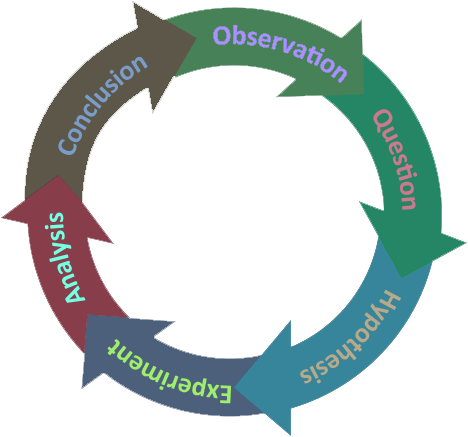The Scientific Method
Our best tool for finding out what's true and what's not.

The Scientific Method is the best process we know of for understanding reality.
- Observation. Take note of what you see in the world around you. We can observe some things directly with our senses, but others require the use of tools and instruments.
- Question. Apply skepticism to what was observed. This involves accounting for biases and applying Occam's razor.
- Hypothesis. Come up with an idea that explains the observations. For the hypothesis to be scientific, it has to be testable and falsifiable.
- Experiment. Conduct some process that tests the hypothesis. Ideally, the results of the test should either support or refute the hypothesis.
- Analysis. This involves assessing and interpreting the results of the experiment, and determining whether they are valid or significant.
- Conclusion. State what was learned. Once the results have been peer-reviewed and are shown to be reproducible, they are generally accepted as scientific consensus.
The process is a cycle, because accepted conclusions almost always spawn further questions which can be tested via the same method.
Science is not perfect. Published studies are always subject to some degree of bias. Researchers, being human, make mistakes. And when the results are just on the cusp of being considered statistically significant, we can't easily determine whether they matter or happened by chance. Still, it remains our best method for interpreting the world around us
Thinking Scientifically
With a bit of mindfulness, you can apply scientific thinking to your everyday life, which will lead to a richer and more insightful understanding of the world around you.
- Meditate on your own biases. Consider how they affect your views on issues you care about, and find ways to compensate for them when you make judgments.
- Exercise humility. Question your own beliefs. Instead of assuming you're right, be willing to change in the face of evidence to the contrary of your beliefs.
- Listen more. We all have plenty to learn from each other, regardless of our wealth, education, or societal status. Insight sometimes presents itself in unexpected ways.
- Verify what you learn. When you hear or read something interesting, take the time to research whether it's actually true.
- Snopes and Politifact can be used for quick fact-checking.
- Google Scholar and other academic search tools can be used to scientific literature on any topic.
- You should also do the due diligence of looking up the credibility of the original source where the information was published.
This process might feel cumbersome, but it is incredibly important in the modern age when misinformation and scams run rampant.